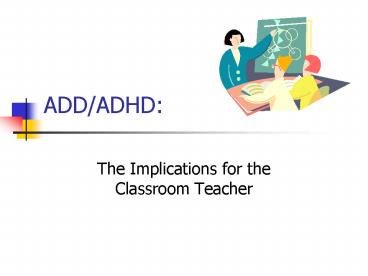ADDADHD: - PowerPoint PPT Presentation
1 / 22
Title: ADDADHD:
1
ADD/ADHD
- The Implications for the Classroom Teacher
2
Review of ADD/ADHD
- 2 - 30 of Americas children have been
diagnosed with ADD/ADHD. - It is estimated that only 3-5 of the school-age
population should fall under the diagnosis. - The United States defines ADD/ADHD under a
medical disease model.
3
Common Characteristics
- Characteristics of children with ADD are
inattention, hyperactivity, and impulsivity. - To be diagnosed with ADHD a child must display
symptoms of inattention and/or hyperactivity-impul
sivity for a period of at least six months to a
degree that is developmentally inappropriate.
4
Common Characteristics
- Also, an individual must have displayed these
symptoms prior to seven years of age.
5
More Characteristics.
- Symptoms must also be present in more than one
situation. - Last, the symptoms must be severe enough that
they impair academic or occupational functioning.
6
What Types of Services Can Students With ADD/ADHD
Receive?
- Children with ADD/ADHD may qualify for
educational services under the Individuals with
Disabilities Education Act of 1990 (IDEA). - Students will not necessarily have an IEP, unless
they have another disability which is the primary
disability.
7
What Types of Services Can Students With ADD/ADHD
Receive?
- Students with only the ADD/ADHD may qualify for
educational services with a Section 504 plan
under the category of other health impaired.
8
What is Section 504?
- Section 504 is not an education act, but rather a
civil rights law that prohibits discrimination
against persons with disabilities by school
districts receiving federal assistance. - A disability is defined as any physical or mental
impairment that substantially limits one or more
major life activities, including learning.
9
More About Section 504.
- Section 504 is not an aspect of special
education. - It is a responsibility of the school district to
provide a special 504 accommodation plan at the
request of the parent, assuming a medical
diagnosis has been made. - Therefore, a student with ADD/ADHD would have an
education plan, but it would not be an IEP as
required under IDEA.
10
Four Fundamental Intervention Areas
- Environmental management
- Instructional accommodations
- Student-regulated strategies
- Medical management
11
Environmental Management
- Environmental management strategies is defined as
all teacher-directed activities that support the
classroom environment established by the teacher
and establish optimal conditions for the learner
as well.
12
Environmental Management Strategies Include
- Preferential Seating This does not always mean
the front seat. This would be a seat in the
room that provides the least amount of
distraction for the learner. - Re-arranging the students day
- Grouping differently
- Re-examining discipline policies
13
Instructional Accommodations
- Instructional accommodations have to do with
varying instructional strategies as it relates to
what is taught, using different teaching
strategies and assessing student progress
differently.
14
Instructional Accommodation Strategies Include
- Using visual aids in addition to oral
presentation. - Breaking down tasks into smaller parts.
- Giving directions one at a time.
- Providing hands-on learning whenever possible.
- Using a variety of assessment tools.
15
Student-Regulated Strategies
- Student-regulated strategies are initially taught
by the teacher and then later become
student-empowered. The student uses the
strategies independently of the teacher to
self-regulate his or her self. These types of
strategies help the learner know himself or
herself as a learner and then regulate him or
herself as necessary.
16
Student-Regulated Strategies Include
- Teacher creates a signal to the student when
behavior needs to be self-corrected. - Use close proximity to signal to the student to
self-correct.
17
Student-Regulated Strategies Include
- Teach student which choices he/she should make in
order to create a positive learning condition for
him/herself. - Provide consistent feedback to let student know
when appropriate strategies have been chosen and
used.
18
Medical Management
- Medical management relates to the role the school
can play as an observer of the behavior of
students diagnosed with ADD/ADHD who are taking
medication.
19
Medical Management Strategies Include
- Monitoring the student and noting behaviors at
various times of the day. - Communicating with parents and physicians
regarding the effects of the medication defines
the school as a collaborator in the management of
medications.
20
What Is Your Plan? Creating an action plan for
your school to help students with ADD/ADHD.
- Break into small groups
- Create a list of strategies under each of the
four intervention categories that you can use
with your students. - Share your groups strategies with the large
group. - Compile one school list that everyone can use as
a resource.
21
What Next?
- Make sure everyone in your school is
knowledgeable about ADD/ADHD. - Mentor each other and share strategies that work.
- Communicate regularly with parents.
- Ask for professional development if needed.
- Familiarize yourself with district policies and
state laws. - Administration needs to support teachers who have
students who disrupt the educational process.
22
One Last Thought
- Diversity has become the icon of American schools
and is here to stay. Students with ADD/ADHD are
part of the challenge.































